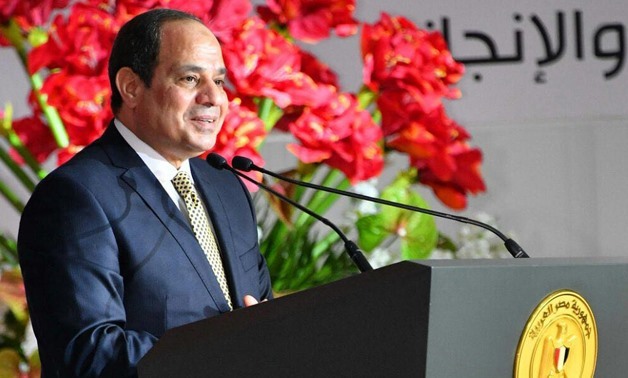
FILE- Egypt’s President Abdel Fatah al-Sisi
CAIRO – 30 June 2020: "History will stand still at the glorious June 30 Revolution, which will remain vivid in the memory of all generations for establishing the values of pride, dignity, patriotism, and conservation of the genuine Egyptian identity from hijack," President Abdel Fatah al-Sisi tweeted Tuesday on the anniversary of the revolution that toppled the regime of the Muslim Brotherhood.
"On the 7th anniversary of our glorious revolution, I assert that we're a nation that made history, and is still making it in all fields inspiring humanity with what it's achieving," the Egyptian president added.
"I renew the oath to go forward with our honorable battle of work, building, and facing internal and external challenges with the same willpower and determination. May God protect Egypt and its people," Sisi concluded.
Around 33 million protesters broke into the streets across the country on June 30, 2013 one year after the election of late President Mohamed Morsi, who was a member of the Supreme Guide Bureau of the outlawed Muslim Brotherhood.
On July 3, 2013, Morsi and his government were overthrown, and the constitution passed in 2012 was suspended. The Muslim Brotherhood president was subject to trial in different cases, including espionage for Qatar, when he got a heart attack on June 17, 2019 after the conclusion of a court session.
Morsi had been handed a 20-year prison sentence over killing and torturing protesters who opposed him in December 2012. That is because he issued a constitutional declaration in late November 2012 that granted him unlimited powers and the power to legislate without judicial oversight or review of his acts.
In 2014, a new constitution was passed by direct secret ballot and incumbent President Abdel Fatah al-Sisi was elected. The current House of Representatives was elected a year later.
"In the past 6 years, Egypt accomplished projects worth LE4.5 trillion," Prime Minister Mostafa Madbouli stated Monday before giving details on certain sectors and growth estimations. The amount was spent on 20,000 projects as clarified by Egyptian Armed Forces Engineering Authority Commander Ihab al-Far who added that a further LE1.1 trillion were spent on 2,800 projects constructed by the Armed Forces.
The projects are pertinent to infrastructure, energy and electricity, water and wastewater networks and plants, health, education, roads, and transportation. In parallel, the state has been combating terrorism that has hit the country for a decade.
Terrorism started to rise in North Sinai during the January 25th Revolution in 2011 when a gas pipeline was bombed. Under Morsi, 16 soldiers were killed in a shooting in 2012. The incident was dubbed Rafah Massacre 1. Seven others were abducted in 2013 but security forces managed to free them.
Terror attacks intensified after the ouster of Morsi as they mainly targeted churches, buildings of security directorates, security checkpoints, ambushes, and patrols causing hundreds of deaths, injuries, and material losses across the country. At present, terrorism is predominantly limited to North Sinai.

Comments
Leave a Comment